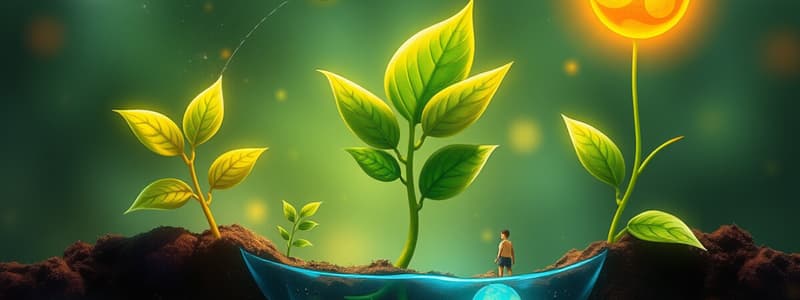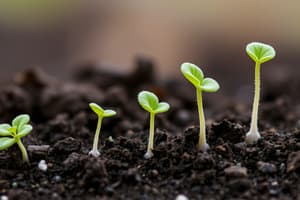Podcast
Questions and Answers
What is the first stage in a plant's life cycle?
What is the first stage in a plant's life cycle?
- Seed (correct)
- Seedling
- Sprouting Seed
- Flowering Stage
What essential conditions are required for a seed to grow?
What essential conditions are required for a seed to grow?
- Soil, light, and nutrients
- Water, sunlight, and fertilizer
- Fertilizer, air, and moisture
- Water, sunlight, and soil (correct)
During which stage do roots develop and absorb food and water?
During which stage do roots develop and absorb food and water?
- Sprouting Seed
- Seedling Stage
- Flowering Stage
- Germination (correct)
What happens to the bud during the flowering stage?
What happens to the bud during the flowering stage?
Which part of the plant is primarily responsible for photosynthesis?
Which part of the plant is primarily responsible for photosynthesis?
Flashcards are hidden until you start studying
Study Notes
Life Cycle of a Plant
- Four stages in a plant's life cycle: seed, sprouting seed, seedling, and flower.
- The first stage begins with a seed that needs to be planted in soil, either in a pot or directly in the ground.
- Essential conditions for growth: water, sunlight, and soil.
Germination
- After planting, the seed requires 1 to 2 weeks to germinate.
- During germination, roots develop, which are crucial for food and water absorption.
Seedling Stage
- The seedling emerges from the soil and is initially small.
- Roots anchor the plant to prevent displacement, while the stem grows longer to support the plant.
- Leaves develop, allowing the plant to perform photosynthesis, a process that converts light and air into food.
Flowering Stage
- A bud eventually forms and transitions into a flower.
- Depending on the seed type, the flower may turn into a fruit, vegetable, or remain as a flower.
- Seeds are located in the center of the flower and are dispersed by wind or animals once the plant ceases growth.
Plant Structure
- Key parts of a plant include:
- Flower: reproductive structure
- Leaves: responsible for photosynthesis
- Stem: supports the plant and transports water
- Roots: anchor the plant and absorb nutrients
Interactive Learning
- Encourages sharing fun facts about plants with peers.
- Engages students with discussion about their favorite plants.
Life Cycle of a Plant
- Four stages: seed, sprouting seed, seedling, and flowering.
- Initial stage involves planting a seed in soil, either in a pot or directly in the ground.
- Growth requires essential conditions: water, sunlight, and nutrient-rich soil.
Germination
- Seeds typically germinate within 1 to 2 weeks after planting.
- Roots are the first to develop, which are vital for the absorption of food and water.
Seedling Stage
- The seedling emerges as a small plant from the soil.
- Root systems anchor the plant, preventing movement, while the stem elongates for support.
- Leaves develop to enable photosynthesis, converting light energy and carbon dioxide into food.
Flowering Stage
- A bud forms and eventually transforms into a flower.
- The type of seed determines whether the flower turns into a fruit, vegetable, or remains a flower.
- Seeds are situated in the flower's center and are dispersed by wind or animals post-growth.
Plant Structure
- Key components of a plant:
- Flower: The reproductive organ.
- Leaves: Crucial for photosynthesis.
- Stem: Provides support and facilitates water transport.
- Roots: Anchor the plant and absorb essential nutrients.
Interactive Learning
- Encourages students to share interesting plant facts with each other.
- Promotes discussions about personal favorite plants to enhance engagement.
Studying That Suits You
Use AI to generate personalized quizzes and flashcards to suit your learning preferences.




